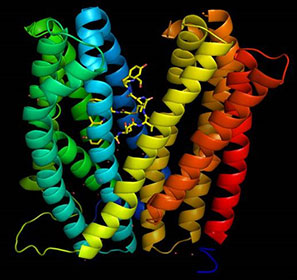JAXA and PeptiDream Inc. have reached a Fee Based Agreement on a Comprehensive Cooperation for the High-Quality Protein Crystal Growth Experiment on "Kibo"
February 24, 2016 (JST)
PeptiDream Inc.
National Research and Development Agency
Japan Aerospace Exploration Agency (JAXA)
PeptiDream Inc. (PeptiDream), a public biopharmaceutical company, and the Japan Aerospace Exploration Agency (JAXA), a national research and development agency, signed an outsourcing agreement (hereafter “this Agreement”) on the comprehensive implementation of the High-Quality Protein Crystal Growth (PCG) experiment on the Japanese Experimental Module (“Kibo”) of the International Space Station.
1. Outline of This Agreement
JAXA offers comprehensive implementation of the PCG experiment, covering from technical consultation on protein production to crystallization experiments in space for the drug target proteins provided by PeptiDream. Unlike conventional agreements made on individual experiments, this Agreement allows for swift and flexible collaboration, so as to keep up with the research progress made by PeptiDream.
PeptiDream is a world-leading company in the field of drug discovery, featuring its unprecedented drug discovery platform and the use of cyclic non-standard peptides. JAXA owns the PCG platform on “Kibo” where the extreme condition of microgravity can be utilized.
This comprehensive research collaboration could accelerate structural studies on medically important proteins along with the candidate drugs. PeptiDream and JAXA both intend to help achieve better human healthcare by creating innovative drugs for the world from Japan.
2. Scheduled Contract Period
From February, 2016 through August 2017
[Background]
JAXA has been conducting PCG experiments on "Kibo" of the ISS since 2009. In the second series of JAXA PCG experiments in September 2015, PeptiDream took a trial-use course on the private company participation scheme, in which JAXA successfully purified and crystallized a PeptiDream-provided protein sample on the ground. This sample will be delivered for crystallization on “Kibo” by a Progress spacecraft at the end of March. After two months of the experiment, the protein will be returned to the earth next June, followed by the collection of crystal diffraction data at SPring-8 (a synchrotron facility in Hyogo, Japan) for obtaining detailed structural information about the protein.
For further information on the JAXA PCG experiment, please visit:
http://iss.jaxa.jp/en/kiboexp/theme/first/hqpc/index.html
[About PeptiDream Inc.]
PeptiDream is a public, Tokyo-based biopharmaceutical company (TSE 4587) founded in 2006 by Kiichi Kubota, the current president, and Hiroaki Suga, outside director and professor at the University of Tokyo, in order to fulfill their dream of serving society by creating innovative drugs for the world from Japan. The company employs its proprietary Peptide Discovery Platform System (PDPS), a state-of-the-art highly versatile peptide generation and selection platform that enables the production of highly diverse non-standard peptide libraries with high efficiency for the discovery and development of best-in-class and first-in-class peptide-based therapeutics. The PDPS platform helps to find “hit” compounds and select lead compounds, as well as to identify the pharmacophore and binding mode of a drug and the target protein. PeptiDream aspires to become a world leader in the discovery and development of novel highly functional peptide therapeutics, in order to address unmet medical needs and improve the quality of life of patients worldwide.
For further information please visit:
http://peptidream.com/en/
[About non-standard cyclic peptides]
A cyclic non-standard peptide has a “macrocyclic” ring-like structure produced by fusing its N- and C-terminals of a non-standard peptide, which is composed of both natural and non-natural amino acids, including synthesized ones.
PeptiDream has developed a way of combining human amino acids with external amino acids to create up to a trillion different combinations, and fusing the two ends together to create a “macrocyclic” ring-like structure. This technology facilitates the quick and inexpensive large-scale production of a wide variety of non-standard peptides.
Unlike conventional peptide-based drugs, non-standard peptides have huge potential for drug discovery due to their structural stability and longer durations in our bodies.

